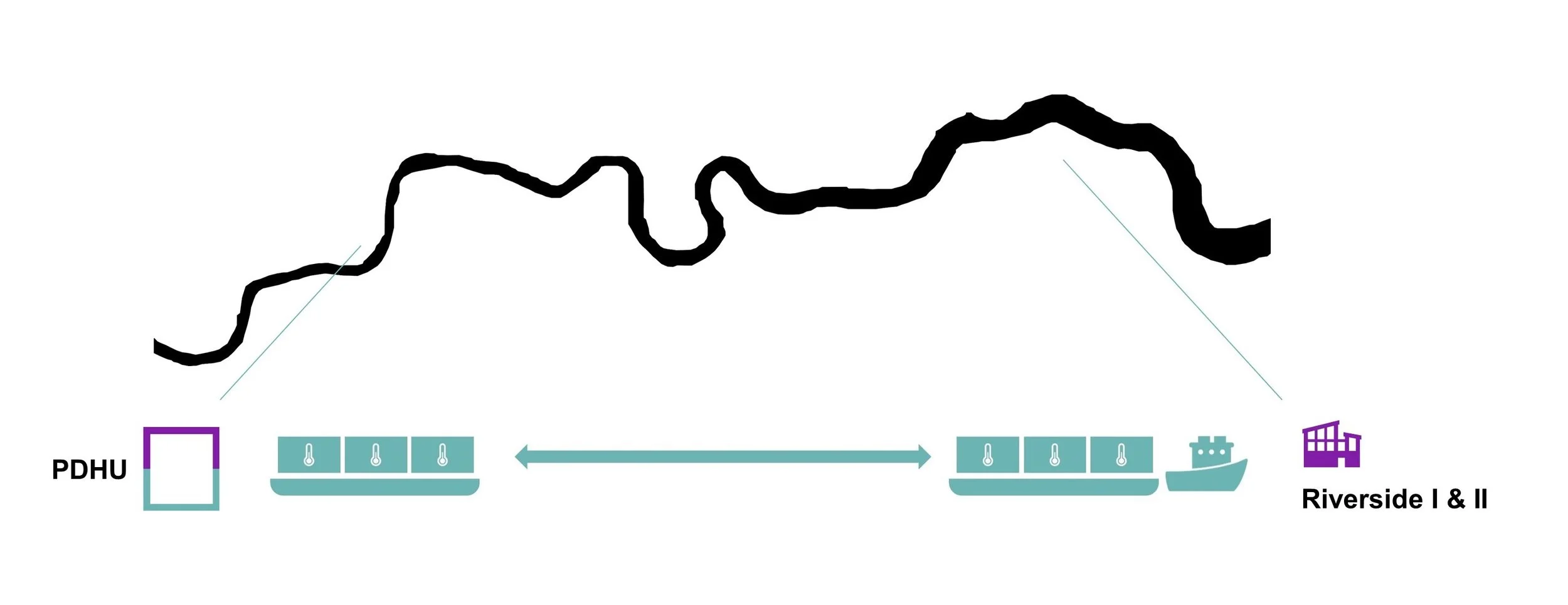Cory and Sheen Parkside partner to decarbonise heating
20 March 2024
Cory, one of the UK’s leading waste management companies, and Sheen Parkside, an arranger of innovative low carbon infrastructure projects, have today announced a partnership to decarbonise heating by moving waste heat along the River Thames in thermal batteries.
The Thames Mobile Heat Consortium, which also includes thermal storage technology company Sunamp, will take heat from along the river – initially from Cory’s Riverside energy from waste (EfW) plant, located on the banks of the Thames in Belvedere – store it in Sunamp thermal batteries, and transport it via barge to major heat consumers, such as district heat networks.
The Thames Mobile Heat Consortium is in discussion with a number of potential heat consumers along the river, and has recently completed a detailed feasibility study.
The project will use world-leading phase change thermal storage, developed by Sunamp and the University of Edinburgh, helping to reinforce British clean technology leadership and drive investment in UK supply chains. The batteries use a salt-based, non-toxic, long-duration phase change material (PCM), and will be housed in specially-designed shipping containers making them easy to transport by barge.
When transporting heat the thermal batteries remain on the barge at all times. At the discharge location a water pipe is run out along a jetty and draws heat from the batteries via an internal heat exchanger. Cory will oversee the marine logistics of the project; the company currently transports most of the waste it processes via a fleet of tugs and barges and has the longest continued lighterage operation on the Thames. This would be run as an independent logistics operation from Cory’s waste transfer operation.
One potential consumer is the Pimlico District Heating Undertaking (PDHU), owned and operated by Westminster City Council, who are considering it as one of several options for decarbonisation. The PDHU is the oldest district heating scheme in the UK, supplying over 3000 homes and 50 commercial and community buildings, and originally took waste heat from Battersea Power Station. If the Thames Mobile Heat Consortium does supply the PDHU, it has the scope to provide c.50GWh of heat per year, which is currently provided by large gas boilers. Heat would be transported on two barges, each carrying up to 120MWh in 40 batteries, travelling 28km each way along the river. Heat supplied on this basis has been modelled to provide heat at 12gCO2/kWh or lower, which is a substantial reduction compared to gas which is modelled at c.216 gCO2/kWh (each calculated according to the UK Treasury Green Book methodology). From completion of planning and approvals, and final commercial agreement, this could be operational in less than a year.
As district heating expands across London, and other large heat users seek to move away from gas, the project has the potential to provide lower carbon heat, rapidly and at scale. It is not dependant on electricity grid upgrades – such as are sometimes required to support large heat pumps – and can supply legacy gas-boiler flow temperatures which heat pumps can struggle to reach efficiently.
The project has the added benefit of reducing reliance on imported fuel and bringing costs down for customers. As the heat does not come from an electrical source, it can also help to balance when demand is placed on the UK’s national grid, which will be a critical challenge as the UK turns to electricity as a way to decarbonise heating.
Chris Girdham, Development Director of Cory, said: “At Cory, we are proud to provide a vital public service which diverts non-recyclable waste from landfill. The EfW process produces huge amounts of heat, and rather than seeing this valuable resource go to waste we want to use it to benefit communities in the UK which are seeking to cut carbon emissions and keep energy bills down. By moving heat to where it’s most needed, we can help to reduce our reliance on fossil fuels and maintain the UK’s role as a clean energy innovator.”
David Carter, Co-Founder & CEO of Sheen Parkside, said: “Over a third of the UK’s territorial carbon footprint comes from burning gas and oil for heating. At the same time, the country wastes a huge of amount of high-grade industrial heat, simply because it’s in the wrong place. Using thermal batteries we can move that heat efficiently. These mobile heat networks can be set up rapidly, flexibly and at scale.”
William Edrich, Global Head of C&I at Sunamp, said: "By harnessing the power of large-scale thermal batteries, we are not just transporting waste heat; we are delivering a global solution to the pressing challenge of our time – the decarbonisation of heat. Together with our consortium partners, we are bringing forward a new era of sustainable energy distribution and demonstrating the application of our world leading thermal storage technology the industrial sphere and heat networks.”
The project’s application is not limited to London. As communities across the UK seek to reduce emissions from heating, the project can be scaled and replicated to connect sources of heat which would otherwise be wasted with the consumers and businesses who will benefit from it.
Work on this project has been supported by Akin and Pinsent Masons (legal advisers), AECOM (technical advisers), Ener-Vate (commercial consultants), Fichtner (owner’s technical advisers at Riverside), Houlder (naval architects) and Mazars (modelling), as well as numerous other companies across the supply chain. Input has also been gratefully received from Triple Point.


